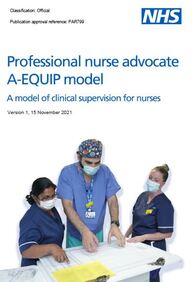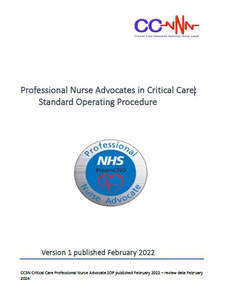Background to PNA's in Critical Care
Pre-Covid data showed that a third of Critical Care Nurses experienced severe burnout, with 86% experiencing one of the three classic symptoms of exhaustion, depersonalisation and reduced personal accomplishment. (Moss et al. 2016).
The pandemic has exacerbated this exponentially leading to a desperate need to prioritise the mental health and well-being of nurses and reduce emotional burnout, (Nicki Credland, Chair of the BACCN, 2021).
In response, Ruth May (Chief Nursing Officer for England) announced in March 2021 the immediate role out of the Professional Nurse Advocate Programme in England starting with 400 critical care nurses…… meaning that there will be two PNAs in every critical care unit in England. Since April 2021, the programme has been rolled out to more than 1,000 nurses from adult acute mental health, community, adult learning disabilities and children and young people. The aim is to have 5000 PNAs, across all specialties in England by April 2022.
The Professional Nurse Advocate (PNA) is a qualified practising nurse who has undertaken a Level 7 PNA accredited Programme that has been developed around the A-EQUIP model (Advocating for Education and Quality Improvement) initially introduced into Midwifery in 2017. The A-EQUIP model includes Restorative Clinical Supervision (RCS), which research shows has a direct impact on recruitment, retention, staff engagement, compassion fatigue and reducing sickness. The model also has an emphasis on Education and Development and Quality Improvement. All of which will have a positive impact on patient safety and experience.
The benefits of PNA’s are summarised by Petit et al (2015) and intend to be demonstrated by the implantation on PNA’s within critical care at LTHT.
The pandemic has exacerbated this exponentially leading to a desperate need to prioritise the mental health and well-being of nurses and reduce emotional burnout, (Nicki Credland, Chair of the BACCN, 2021).
In response, Ruth May (Chief Nursing Officer for England) announced in March 2021 the immediate role out of the Professional Nurse Advocate Programme in England starting with 400 critical care nurses…… meaning that there will be two PNAs in every critical care unit in England. Since April 2021, the programme has been rolled out to more than 1,000 nurses from adult acute mental health, community, adult learning disabilities and children and young people. The aim is to have 5000 PNAs, across all specialties in England by April 2022.
The Professional Nurse Advocate (PNA) is a qualified practising nurse who has undertaken a Level 7 PNA accredited Programme that has been developed around the A-EQUIP model (Advocating for Education and Quality Improvement) initially introduced into Midwifery in 2017. The A-EQUIP model includes Restorative Clinical Supervision (RCS), which research shows has a direct impact on recruitment, retention, staff engagement, compassion fatigue and reducing sickness. The model also has an emphasis on Education and Development and Quality Improvement. All of which will have a positive impact on patient safety and experience.
The benefits of PNA’s are summarised by Petit et al (2015) and intend to be demonstrated by the implantation on PNA’s within critical care at LTHT.
|
|
PNA's in West Yorkshire
Every critical Care unit in West Yorkshire has at least on nurse who has completed or is undertaking PNA training. They are there to support all critical care nurses through restorative clinical supervision (RCS), education/development and quality improvement.
Restorative Clinical Supervision can be provided as a 1:1 or group session.
To arrange a RCS session or find out more about this role speak to the PNA on your unit. If you wish to contact a PNA outside of your own unit please contact [email protected]
Restorative Clinical Supervision can be provided as a 1:1 or group session.
To arrange a RCS session or find out more about this role speak to the PNA on your unit. If you wish to contact a PNA outside of your own unit please contact [email protected]
Three helpful P's - What are Psychologists, PNA's ad Peer Supporters and how they can work together for ICU staff wellbeing.
A podcast by Dr Julie Highfield, Consultant Clinical Psychologist. National Wellbeing Director, ICS
A podcast by Dr Julie Highfield, Consultant Clinical Psychologist. National Wellbeing Director, ICS
Proudly powered by Weebly


